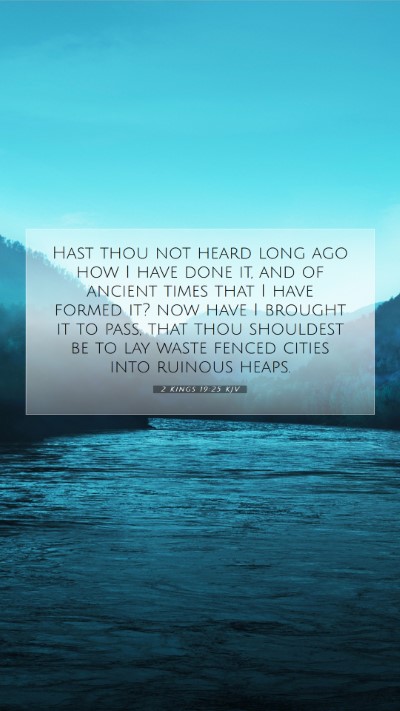2 Kings 19:25 - Bible Verse Meaning and Commentary
Verse: "Hast thou not heard long ago how I have done it; and of ancient times that I have formed it? now have I brought it to pass, that thou shouldest be to lay waste fenced cities into ruinous heaps." (2 Kings 19:25 KJV)
Overview
The verse from 2 Kings 19:25 is a profound declaration from God addressing the Assyrian king Sennacherib. It emphasizes God's sovereignty over historical events and His control over nations and their outcomes.
Insights from Public Domain Commentaries
-
Matthew Henry's Commentary:
Henry interprets this verse as God's affirmation of His power and preordained plan. He points out that God reminds Sennacherib of His long-standing influence over nations, asserting that the ruins left by Assyrian military might are part of His divine purpose.
-
Albert Barnes' Notes:
Barnes emphasizes the historical context, noting how God has orchestrated events from ancient times. This verse serves as a reminder that the strength of nations is ultimately subject to God's will, and their downfall can be traced back to His declared intentions.
-
Adam Clarke's Commentary:
Clarke provides a detailed analysis of the verb “formed,” suggesting that it refers to God's creative authority, not only in creation but also in the rise and fall of empires. He notes that this declaration serves as both a warning and a proclamation of God's relentless power.
Key Themes and Concepts
- Divine Sovereignty: God has ultimate authority over nations and histories.
- Historical Awareness: The verse reflects God’s omniscience and control over past and future events.
- Purpose of God: Every event fulfills God's divine plan, including the destruction of cities by Assyrians.
Application of the Verse
This verse can be applied in various ways:
- Understanding God's Control: Believers can find comfort in knowing that God orchestrates the events in their lives.
- Historical Context: It encourages study of biblical history to appreciate God's hand in shaping nations.
- Faith in Adversity: Reflecting on God’s past deeds can strengthen faith in present struggles.
Additional Bible References
- Isaiah 37:26: References the prophecy against Assyria.
- Romans 13:1: Discusses God’s authority over governments.
- Psalms 115:3: Declares that our God is in the heavens; He does all that He pleases.
Conclusion
2 Kings 19:25 serves as a significant reminder of God's omnipotence and His role in history, reassuring believers of His ultimate control over the world. Engaging with biblical texts through study and commentary can deepen understanding and provide clarity in times of uncertainty.
Further Study Recommendations
For those seeking deeper Bible study insights, consider exploring resources on:
- Bible study guides on the kings of Israel and Judah.
- Historical context of Old Testament prophecies.
- Symbolism in the narrative of Assyria’s rise and fall.


